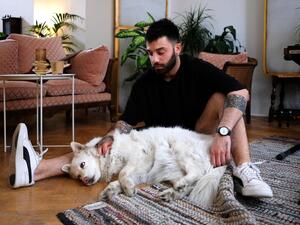Refugee orchestra wins standing ovation

Refugee orchestra wins standing ovation
On a rainy Sunday evening in the quiet eastern French town of Besançon, thunderous applause fills the concert hall where eight refugee musicians from five countries acknowledge a standing ovation from the enthusiastic audience.
The musicians have just finished their first concert in the Kursaal concert hall as part of the Besançon Music Festival.
The programme ended with the performance by Bangladeshi singer Azmari Nirjhar of the Afghan love song “Laili Jaan”, composed by the late singer Ahmad Zahir. The haunting song dates from a time when the people of Afghanistan lived in peace and freedom.
The performers, overcome by the enthusiastic response, feel like musicians again for the first time in a long while.
"I am very, very happy because, after a long time, I have started my career again,” says the singer, Nirjhar. “In Bangladesh, I was a professional singer and everybody knows me. I always missed that moment, my environment, my stage, my musicians and all the instruments. Today it was our first concert, it was great.”
She and her fellow musicians are part of the Orpheus XXI Orchestra, the brainchild of the Catalan viol player Jordi Savall, which is designed to give refugee musicians the opportunity to work with members of his music ensemble on a repertoire of oral, vocal and instrumental music from their countries of origin. The project is funded by the European Commission and supported by ICORN (International Cities of Refugee Network), the Fondation Orange and the Fondation Edmond de Rothschild, in partnership with COOP’AGIR.
The players, about 20 in total, were professional musicians in their home countries before they were forced to flee conflict or persecution.
Savall’s aim is to use music as a means of giving expression to the traditions of the musicians’ home countries, of bringing them together and restoring their dignity.
The musicians have been living and rehearsing at La Saline Royale, an 18th century saltworks in the nearby village of Arc-et-Senans which is now a UNESCO World Heritage site and is used for cultural events and exhibitions.
Anastasia Luniova, a refugee from Belarus who plays the cimbalom, a traditional stringed instrument from Eastern Europe, said it was the first time they had performed on stage together. "It was something magical,” she says. “I was scared a bit, but in fact the public is helping us because they clapped enormously.”
The Orpheus musicians, who are from a variety of cultures, perform vocal and instrumental music from the folk traditions of Syria, Afghanistan, Belarus, Bangladesh and Sudan. Their instruments include the harmonium as well and the kanun, a stringed instrument that is plucked, and the ney, a traditional flute, both from the Middle East.
“I am very happy and all the musicians are really really nice people," says Nirjhar.
Luniova says the song she sang was about a songbird that was far from its country. “Singing allows him to remember his family, his country.”
Syrian flautist Moslem Rahal directed the ensemble for the Besançon concert.
"It was not easy in the beginning but finally it was really great, a great concert,” he says. “I am very happy because people like it very much.
“They stand very long time with clapping and clapping. It's very nice and it's become a real concert and not only small project. They are also great musicians.”
When the performance was over, members of the audience crowded round the door to the musicians’ dressing room, eager to talk to the performers.
"The public gave them a very warm reception because they have discovered new instruments and a new repertoire and realize that, in the end, people from very different countries can come together through an art form that is universal,” says Serge Bufferne, the coordinator of the Orpheus XXI project.
He says such events had a positive effect that contrasted with negative media reports about the dangers represented by the arrival of refugees in Europe.
The next stage of the project will include children, and the creation of a children’s orchestra.















